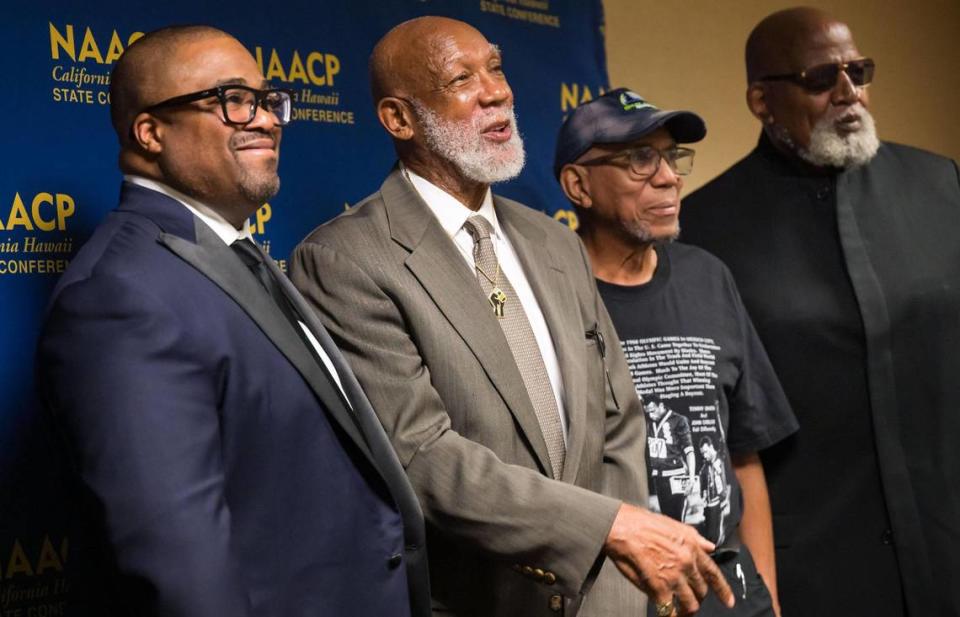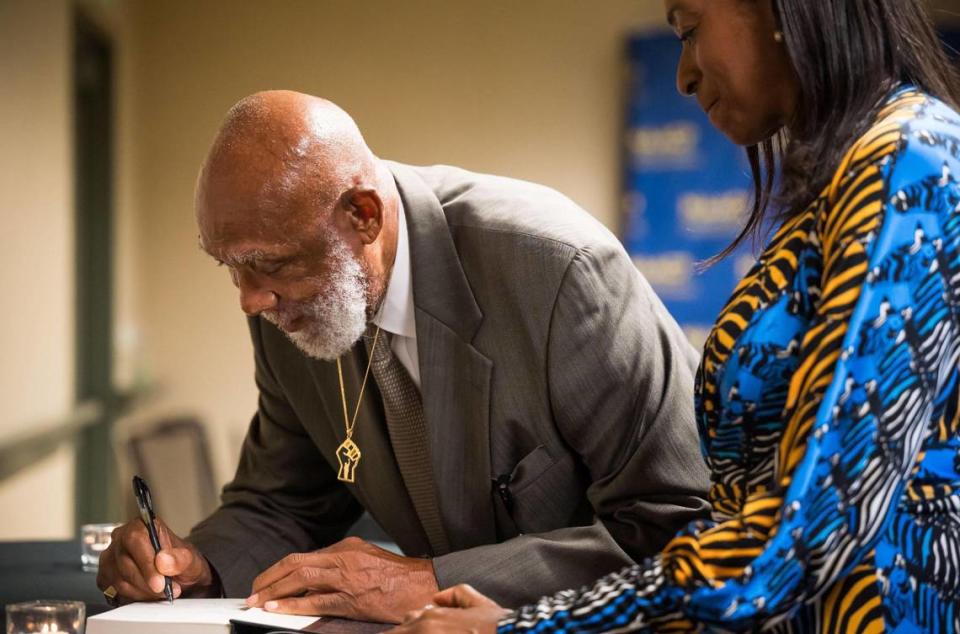Still ‘in the midst of a struggle,’ NAACP honors John Carlos, Tommie Smith in Sacramento
- Oops!Something went wrong.Please try again later.
- Oops!Something went wrong.Please try again later.
John Carlos wore a necklace with a Black fist pendant over his tie and dress shirt Saturday — the same way he wore beads to oppose lynchings during the moment that made him a historic figure in the civil rights movement.
That moment, of course, came in 1968 in Mexico City, where Carlos stood alongside Tommie Smith on the medal stand at the Olympic Games. They wore black gloves and raised their fists during the playing of the “Star Spangled Banner,” symbolizing their stand against racial injustice when tensions were at a boiling point following the assassinations of Martin Luther King Jr. and Robert Kennedy.
The California Hawaii NAACP honored Carlos and Smith during its state conference Saturday at the Sheraton Grand Sacramento Hotel, inducting them into the organization’s Legacy Hall of Fame. Smith and Carlos were joined by Harry Edwards and Kenneth Noel in their induction class. Smith was unable to attend the event.

Carlos and Smith are still remembered for their stance against injustice more than 50 years after their demonstration during the Olympic medal ceremony.
“It reached the far end of the earth,” Carlos told The Sacramento Bee. “Individuals were going through the same changes that Blacks in America were going through. We had a blueprint. Other individuals in other parts of the world didn’t have that blueprint. They didn’t have that courage, they didn’t have the audacity to defy their environment. ... And then it started creating a revolution around the world in terms of people fighting for equality.”
The demonstration from Smith and Carlos came after they won gold and bronze medals in the 200-meter dash. That moment became a focal point in a movement as athletes used their platforms to address racial inequalities. It came a year after Muhammad Ali refused to get drafted into the Vietnam War and 21 years after Jackie Robinson became the first Black player in Major League Baseball amid harsh criticism from the public.
The legacy of Carlos and Smith has continued to inspire generations after them, such as Colin Kaepernick’s decision to kneel during the national anthem to protest police brutality and the Milwaukee Bucks boycotting a playoff game in 2020 over the police killing of Jacob Blake in Kenosha, Wisconsin.
That came during the same summer much of the sports world rallied around the memory of George Floyd, who was killed by Minneapolis police, and major sports leagues adopted policies allowing athletes to address those issues without punishment.
But Carlos and Smith didn’t enjoy the same treatment in 1968. They were suspended by the U.S. Olympic Committee following their demonstration and were ordered to vacate the Olympic village.
And while sports have become a more mainstream platform to normalize dialogues on race, systemic issues remain a focal point.
“We have to understand that what happened in 1968 was a continuation of an ongoing struggle,” said Edwards, a renowned sociologist, professor and activist with ties to the San Francisco 49ers. “And it’s not individuals or individual personalities or leaders that generate struggle, it’s conditions. And those conditions, so deeply rooted within the context of the American experience, continue to prevail today.
“So generation after generation of activist come to the fore, step up, make a statement, and then subsequently, another generation of activists does the same thing.”

Edwards went on to cite the overturning of Roe v. Wade relating to women’s rights, the Voting Rights Act of 1965 being challenged at the Supreme Court level earlier this month and history books being banned from schools as issues that need attention.
“The reality is that these movements will continue,” Edwards said. “They are just as sure to arise as our conditions continue to be dynamic and changing. And there are no final victories. So, you ask me where we are today? We are in the midst of a struggle.”
Carlos, who went to San Jose State after transferring from East Texas State University, has been awarded the Arthur Ashe Award for Courage and was recognized by President Barack Obama along with the Olympic and Paralympic teams in 2016. He was asked what being honored in Sacramento meant to him.
“Any time I receive an honor ,I attribute that to my mother and my father, to my kids,” he said. “I didn’t do it in Mexico City for any honors. I did it because I thought it was the right thing to do.”

